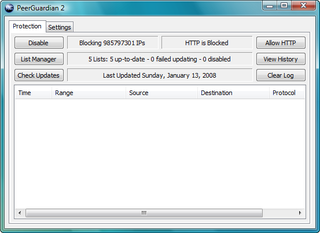
Peer-to-peer (P2P) computing or networking is a distributed application architecture that partitions tasks or workloads between peers. Peers are equally privileged, equipotent participants in the network, forming a peer-to-peer network of nodes.
Uploading refers to transmitting data from one computer system to another through means of a network. Common methods of uploading include: uploading via web browsers, FTP clients, and terminals (SCP/SFTP). Uploading can be used in the context of clients that send files to a central server. While uploading can also be defined in the context of sending files between distributed clients, such as with a peer-to-peer (P2P) file-sharing protocol like BitTorrent, the term file sharing is more often used in this case. Moving files within a computer system, as opposed to over a network, is called file copying.

A distributed hash table (DHT) is a distributed system that provides a lookup service similar to a hash table. Key–value pairs are stored in a DHT, and any participating node can efficiently retrieve the value associated with a given key. The main advantage of a DHT is that nodes can be added or removed with minimum work around re-distributing keys. Keys are unique identifiers which map to particular values, which in turn can be anything from addresses, to documents, to arbitrary data. Responsibility for maintaining the mapping from keys to values is distributed among the nodes, in such a way that a change in the set of participants causes a minimal amount of disruption. This allows a DHT to scale to extremely large numbers of nodes and to handle continual node arrivals, departures, and failures.
BitTorrent, also referred to as simply torrent, is a communication protocol for peer-to-peer file sharing (P2P), which enables users to distribute data and electronic files over the Internet in a decentralized manner. The protocol is developed and maintained by Rainberry, Inc., and was first released in 2001.
MLDonkey is an open-source, multi-protocol, peer-to-peer file sharing application that runs as a back-end server application on many platforms. It can be controlled through a user interface provided by one of many separate front-ends, including a Web interface, telnet interface and over a dozen native client programs.

Bram Cohen is an American computer programmer, best known as the author of the peer-to-peer (P2P) BitTorrent protocol in 2001, as well as the first file sharing program to use the protocol, also known as BitTorrent. He is also the co-founder of CodeCon and organizer of the San Francisco Bay Area P2P-hackers meeting, was the co-author of Codeville and creator of the Chia cryptocurrency which implements the proof of space-time consensus algorithm.
An anonymous P2P communication system is a peer-to-peer distributed application in which the nodes, which are used to share resources, or participants are anonymous or pseudonymous. Anonymity of participants is usually achieved by special routing overlay networks that hide the physical location of each node from other participants.

BitComet is a cross-protocol BitTorrent, HTTP and FTP client written in C++ for Microsoft Windows and available in 52 different languages. Its first public release was version 0.28. The current BitComet logo has been used since version 0.50.

PeerGuardian is a free and open source program developed by Phoenix Labs (software). It is capable of blocking incoming and outgoing connections based on IP blacklists. The aim of its use was to block peers on the same torrent download from any visibility of your own peer connection using IP lists. The system is also capable of blocking custom ranges, depending upon user preferences.
The eDonkey Network is a decentralized, mostly server-based, peer-to-peer file sharing network created in 2000 by US developers Jed McCaleb and Sam Yagan that is best suited to share big files among users, and to provide long term availability of files. Like most sharing networks, it is decentralized, as there is no central hub for the network; also, files are not stored on a central server but are exchanged directly between users based on the peer-to-peer principle.
BitTorrent is a proprietary adware BitTorrent client developed by Bram Cohen and Rainberry, Inc. used for uploading and downloading files via the BitTorrent protocol. BitTorrent was the first client written for the protocol. It is often nicknamed Mainline by developers denoting its official origins. Since version 6.0 the BitTorrent client has been a rebranded version of μTorrent. As a result, it is no longer open source. It is currently available for Microsoft Windows, Mac, Linux, iOS and Android. There are currently two versions of the software, "BitTorrent Classic" which inherits the historical version numbering, and "BitTorrent Web", which uses its own version numbering.
A BitTorrent tracker is a special type of server that assists in the communication between peers using the BitTorrent protocol.
This is a timeline of events in the history of networked file sharing.
Protocol encryption (PE), message stream encryption (MSE) or protocol header encrypt (PHE) are related features of some peer-to-peer file-sharing clients, including BitTorrent clients. They attempt to enhance privacy and confidentiality. In addition, they attempt to make traffic harder to identify by third parties including internet service providers (ISPs). However, encryption will not protect one from DMCA notices from sharing illegal content, as one is still uploading material and the monitoring firms can merely connect to the swarm.
Founded in 2004 in New York City, Pando Networks was a managed peer-to-peer (P2P) media distribution company backed by Intel Capital, BRM Capital and Wheatley Partners. The company specialized in cloud distribution of games, video and software for publishers and media distributors and also operated a freemium consumer business for sending large files.

libtorrent is an open-source implementation of the BitTorrent protocol. It is written in and has its main library interface in C++. Its most notable features are support for Mainline DHT, IPv6, HTTP seeds and μTorrent's peer exchange. libtorrent uses Boost, specifically Boost.Asio to gain its platform independence. It is known to build on Windows and most Unix-like operating systems.
In the BitTorrent file distribution system, a torrent file or meta-info file is a computer file that contains metadata about files and folders to be distributed, and usually also a list of the network locations of trackers, which are computers that help participants in the system find each other and form efficient distribution groups called swarms. Torrent files are normally named with the extension .torrent.
Torrent poisoning is intentionally sharing corrupt data or data with misleading file names using the BitTorrent protocol. This practice of uploading fake torrents is sometimes carried out by anti-infringement organisations as an attempt to prevent the peer-to-peer (P2P) sharing of copyrighted content, and to gather the IP addresses of downloaders.

Pablo Rodriguez is a Spanish computer scientist and researcher, who is best known for his research in the mid-2000s on peer-to-peer file sharing and user-generated content. After working for technology and communications companies AT&T and Microsoft Research, Rodriguez returned to Spain in 2006 to become the research director for telecommunications provider Telefónica. In 2010 he took a position as an adjunct professor at Columbia University in New York.

Twister is a decentralized, experimental peer-to-peer microblogging program which uses end-to-end encryption to safeguard communications. Based on BitTorrent- and Bitcoin-like protocols, it has been likened to a distributed version of Twitter.







